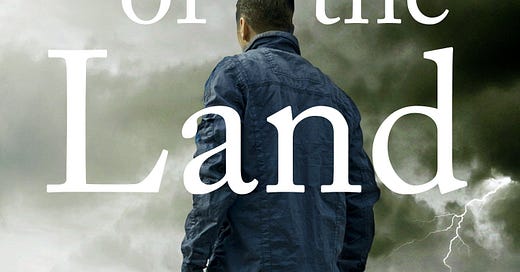Lie of the Land by Michael F. Russell
Polygon, 304ppGiven the state of the country at the moment, it’s perhaps unsurprising that dystopian science fiction is enjoying something of a revival. With Dan Grace’s Winter and David Mitchell’s The Bone Clocks showing Scotland and Ireland respectively collapsing in on themselves, Michael F. Russell’s Lie of the Land is a welcome and terrifying addition to the conversation.
Living in Glasgow under Fascist state control, Carl is a journalist in a dying industry. The government has farmed security out to the private sector who use technology to track and control the population. When he receives information and a sample of some new piece of technology, he contrives to get a travel pass from Glasgow and heads to the far north-west corner of Scotland in pursuit of a big scoop. While there SCOPE, a new communications web, is turned on and whether through design or accident, the resonance causes intense pain, nose bleeds and death. Inverlair is in a ‘notspot’, a hole in coverage, and Carl finds himself trapped in the village. Unable to leave and unwilling to stay, Carl struggles to settle in a place that may have saved his life but which feels more like a prison camp than a haven.
In many ways it’s a classic set up: the reader travels with an outsider into a community and watches with him as the new dynamic causes ruptures in already fragile relationships. It’s rural noir in a near-future setting, all the more terrifying for how plausible each speculation is.
The residents of Inverlair can only assume that everyone else in the country is dead. Loved ones who were away from the village won’t be coming back. What follows is a gripping story of rural infighting and bare survivalism. Factions quickly form, a ‘committee’ is set up to control rationing and to hand out jobs, and law and order are replaced by vigilante justice. A cast of misfits including drug-growing Terry, home-brew making Hendrik, a group of teenagers who play chicken with the deadly waves encircling the village as a way to break the monotony and the ‘stalker’, a lonely figure responsible for hunting deer and keeping the village in meat, enliven what could be a depressing scenario.
It all gets a bit Lord of the Flies when the stronger men band together and rig the rationing system to favour themselves and use violence to get their way. The one policeman in the village abdicates all responsibility in the face of superior numbers. Carl, an outsider anyway, takes up with Alec, the stalker, and learns how to hunt and shoot, setting up the tantalising possibility of a full-scale civil war breaking out.
One of the problems with ‘post-event’ science fiction is always that the most dramatic moment in the story – the ‘event’ that causes the breakdown of society – necessarily comes at the beginning. To combat this, Russell uses an interesting structure, moving back and forth in time to heighten tension and create an air of mystery about what exactly happened in the immediate aftermath of SCOPE being turned on. It is also to his credit that he shows and explains the event, rather than taking the all too common easy way out by having some non-specific catastrophe semi-forgotten in the mists of time. By extrapolating from current technology, science and political trends, Russell has sculpted an end of the world that seems not only plausible, but potentially imminent.
It’s heartening to see this book brought out without all the usual trappings, winks and apologies that science fiction often receives from mainstream publishing. With writers like Michel Faber recently returning to science fiction, David Mitchell diving into deep fantasy waters and Kazuo Ishiguro writing about a thoroughly real and unallegorical dragon (I urge you to seek out the interview by the Guardian’s Claire Armitstead with Ishiguro as a perfect embodiment of how genre is still dismissed as somehow lesser), the false barriers - the M barrier as I call it (named for the M inserted in Iain Banks’s name to distinguish between ‘genre’ and ‘mainstream’ works) – is finally breaking down.




